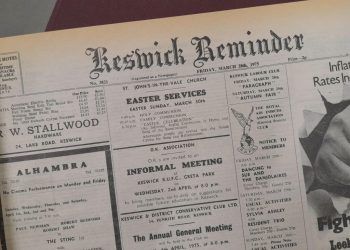
Nobbut Laiking, by Ross Brewster
So I’m not the only one who doesn’t trust those pesky weather forecasts.
Scientists at the University of Reading’s meteorology department have been carrying out some research and they agree.
When you are an outdoor sports fan the weather is everything really. But I find forecasts increasingly unreliable.
A few weeks ago I planned a trip to watch some cricket. I was deterred by the BBC forecast on my laptop which suggested three days of rain. In fact, apart from a damp first morning, they hardly lost a minute’s play — and I was stuck at home wishing I had ignored the gloomy prognostications.
The Reading academics must also be cricket fans. They say the BBC offers one of the less reliable weather apps, although to be fair a string of other forecasters failed to measure up to their checks in a period from August to early September.
Forecasts, they concluded, were “often wrong” and tended to be on the pessimistic side.
Gill Haigh, managing director of Cumbria Tourism, told the Sunday Times earlier this year that weather symbols indicating a more pessimistic picture than the reality were impacting on local businesses.
Could it be that we are suffering from Michael Fish Syndrome? There was that infamous 1987 hurricane down south that caused vast amounts of damage, which the BBC predicted would be little more than a strong wind. As a consequence forecasters tend to err on the side of caution, not wishing to be caught out again so comprehensively by describing a Noah’s Ark level downpour as light drizzle.
Next day forecasts are usually quite accurate, but it’s the week on Wednesday types among us that need more reliable forecasts. Otherwise we may as well stand on top of Blencathra and hold a wet finger to the breeze and have a guess.
Electric cars proving a turn off
Most of the major motor manufacturers are rolling back production of electric cars.
Evidence, I suggest, that this particular element in the race to net zero is set to become one of the follies of the age.
While I know people who have bought into EV and love their silent motors, I speak to many more who express doubt that they are a good investment, or a development that will last the course.
Fiat, for example, has paused production of its electric city car the 500 due to a slump in demand.
Volvo has abandoned its ambitions of becoming an electric-only auto maker by 2030.
Several more companies, notably Toyota, have slashed production blaming a lack of orders. They say older drivers are particularly reticent to switch on to battery-powered vehicles and EVs are not the answer while a billion people worldwide don’t even have electricity.
Reports only last week said ministers are planning to back away from a total ban on the sale of petrol and diesel driven cars by allowing hybrids to remain on the market until 2035.
Labour, in its manifesto, had big plans for the demise of new petrol driven cars. They have not convinced millions of would-be purchasers who have concerns about range, re-sale values and shortage of charging points. And what do we do with the old batteries?
There are just too many doubts to expect the average motorist to go plunging in on new electric-only vehicles.
Greenpeace describes hybrids— they use petrol and diesel engines in conjunction with a battery — as the motor industry’s “wolf in sheep’s clothing”.
But for most people, especially those living in rural areas, getting around is costly enough these days without the pure ideologies of environmental lobbyists.
Electric may have looked like the future. But as time goes by it raises more questions and doubts than it solves.
Out of step with watching Strictly
Do you watch Strictly? It’s not my scene. I can’t dance for the life of me. The archetypal two left feet. Reminds me of the old song, I Won’t Dance, Don’t Ask Me.
I sometimes wish I had been able to dance. It was a useful social asset at one time. I had a pal who was a wonderful dancer. He was no good looker, but could he pull the birds! He would go to dances and women were queuing to get on his list.
Those were the days of Victor Silvester and his orchestra. He was still on the go when TV came in and starred on This Is Your Life with Eamonn Andrews once. It wasn’t super competitive like Strictly. It was all very gentlemanly and ladylike back then.
These days mention Peggy Spencer and no-one under 70 would know what you meant. She and her partner did lots of ballroom dancing for television.
Strictly Come Dancing has got itself into trouble with all these temperamental men and easily upset women partners.
I suspect some of them resent being asked to train hard for the event. I know Helen Skelton said she put long hours training before she went on the show.
It’s got little to do with the foxtrot and waltz and has become more showmanship with all those acrobatic lifts. I know for a fact I’d be no good. Me and my dodgy back.








